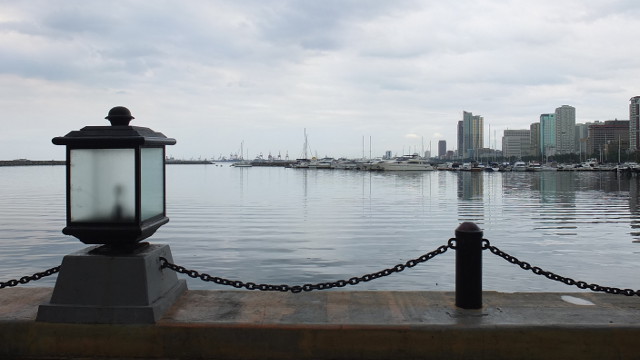SUMMARY
This is AI generated summarization, which may have errors. For context, always refer to the full article.
MANILA, Philippines – Led by Manila Archbishop Luis Antonio Cardinal Tagle, 21 bishops appealed to President Benigno Aquino III to stop the reclamation projects along Manila Bay.
In a rare letter to the President dated November 19, the bishops of the Ecclesiastical Province of Manila opposed the 38 projects set to reclaim 26,234 hectares of Manila Bay. They cited the “far-reaching consequences for the people and for the eco-system in these areas.” (READ: INFOGRAPHIC: Why Manila Bay matters.)
Tagle and the other bishops wrote: “Our basic position is based on the question: Will the projected economic gains sufficiently and justifiably compensate the damages in life, ecosystems, and property in the future? And at the end, who will benefit from the foreseen questionable gains and the culture of gambling, prostitution, greed, and materialism that could emerge? Is this the legacy we want to leave to future generations?”
They told the President they are “prayerfully looking forward” to his “very favorable decision with our people who are opposing the reclamation of Manila Bay.”
The Archdiocese of Manila published the letter on its website on Friday, December 13.
Signatories include Manila Archbishop Emeritus Gaudencio Cardinal Rosales; Manila Auxiliary Bishops Broderick Pabillo and Bernardo Cortez; the bishops of Antipolo, Cubao, Imus, Kalookan, Malolos, Novaliches, Parañaque, Pasig, and San Pablo; the vicar apostolics of Puerto Princesa and Taytay of Palawan; and the military ordinariate of the Philippines.
Biggest threat
In their letter, the bishops identified 3 reclamation projects that worry them the most because of their imminent execution:
- reclamation of 148 hectares in Manila for an entertainment hub dubbed the “Solar city”
- reclamation of 300 hectares in Las Piñas/Parañaque
- reclamation 300 hectares in Pasay
The bishops cited safety concerns as the biggest threat posed by the reclamation projects. Consultations with scientists Dr Kelvin Rodolfo and Dr Fernando Siringan allowed them to identify 3 serious hazards of reclamation:
1. It will worsen the already disastrous flooding in places like Malabon, Navotas, Cavite, Bulacan, and Pampanga by accelerating land subsidence. Land subsidence happens when sea water enters the soil, making the soil so weak the surface collapses thereby lowering the level of soil on the surface. The lower the soil surface, the more easily it will be flooded by rising sea levels.
2. Because of land subsidence, areas by Manila Bay will be more exposed to storm surges or flooding due to a sudden rise in sea levels during storms. Such storm surges submerged Roxas Boulevard during Typhoon Pedring in 2011. Storm surges also killed thousands of people when Super Typhoon Yolanda (Haiyan) ravaged the country in November. (READ: Knowing storm surge risks.)
3. Reclamation will cause soil liquefaction, which happens when soil sediments are saturated by water, thereby making the substance act like liquid. Because of the “liquified” soil around building foundations, buildings will not stand a chance against earthquakes – especially ones like the magnitude-7.2 earthquake that struck the Visayas.
The legal violations of the reclamation projects also disturb the bishops. (READ: Manila Bay: Sunset and the law)
The National Integrated Protected Areas System (NIPAS) Act reserves the Manila Bay area as a National Park. The Las Piñas-Parañaque Critical Habitat and Ecotourism Area (LPPCHEA), the location of another proposed reclamation project, enjoys international protection. It is included in the Ramsar List of Wetlands of International Importance, which promotes the conservation of wetlands all over the world.
For these reasons, the bishops wrote, “we have to exercise our responsibility as pastors and protectors of God’s flock and be in solidarity with all of humanity in the call to be stewards of God’s creation.”
“Therefore, we wish to present our stand of opposition to the Manila Bay Reclamation Projects,” the prelates said.
Common good vs profit
Some of the country’s biggest companies are behind the reclamation projects. SM Land plans to undertake a P54.5-billion reclamation project in partnership with Pasay City. The project will reclaim 300 hectares of Manila Bay.
In their letter to Aquino, the bishops reminded the President to put the common good before profit for a few.
The bishops said: “There is no question that the project will generate spectacular profits for the corporations pushing the projects and for local government units, many of which have serious debt problems. Should the decision to allow the project be determined only by financial considerations?”
“At the heart of Catholic social teaching is the concept of the common good. This is what should guide us in our decision regarding the reclamation project. So we ask, ‘Who stands to benefit from this project?'”
They also quoted the Book of Genesis in the Bible to emphasize the need to protect the historic Manila Bay:
“‘God saw everything that He had made, and behold, it was very good’ (Gen 1:31). Manila Bay is God’s creation and is God’s gift to the Filipino people.”
Manila Bay reclamations have been met with fierce opposition by many citizens in the past, even though many reclamation projects like SM Mall of Asia and the Cultural Center of the Philippines (CCP) have pushed through.
The bishops echoed the suggestion of Tourism Secretary Ramon Jimenez to focus development efforts on the existing cultural treasures surrounding Manila Bay.
“Wouldn’t it be wiser, therefore, to boost tourism, cultural architectures, and to restore old historical sites and buildings, rather than build on reclaimed land to the detriment of the livelihood of people and the environment?”
The billions of pesos for reclamation can be spent on improving basic services and protecting ecosystems, the bishops added. – Rappler.com
Add a comment
How does this make you feel?

There are no comments yet. Add your comment to start the conversation.